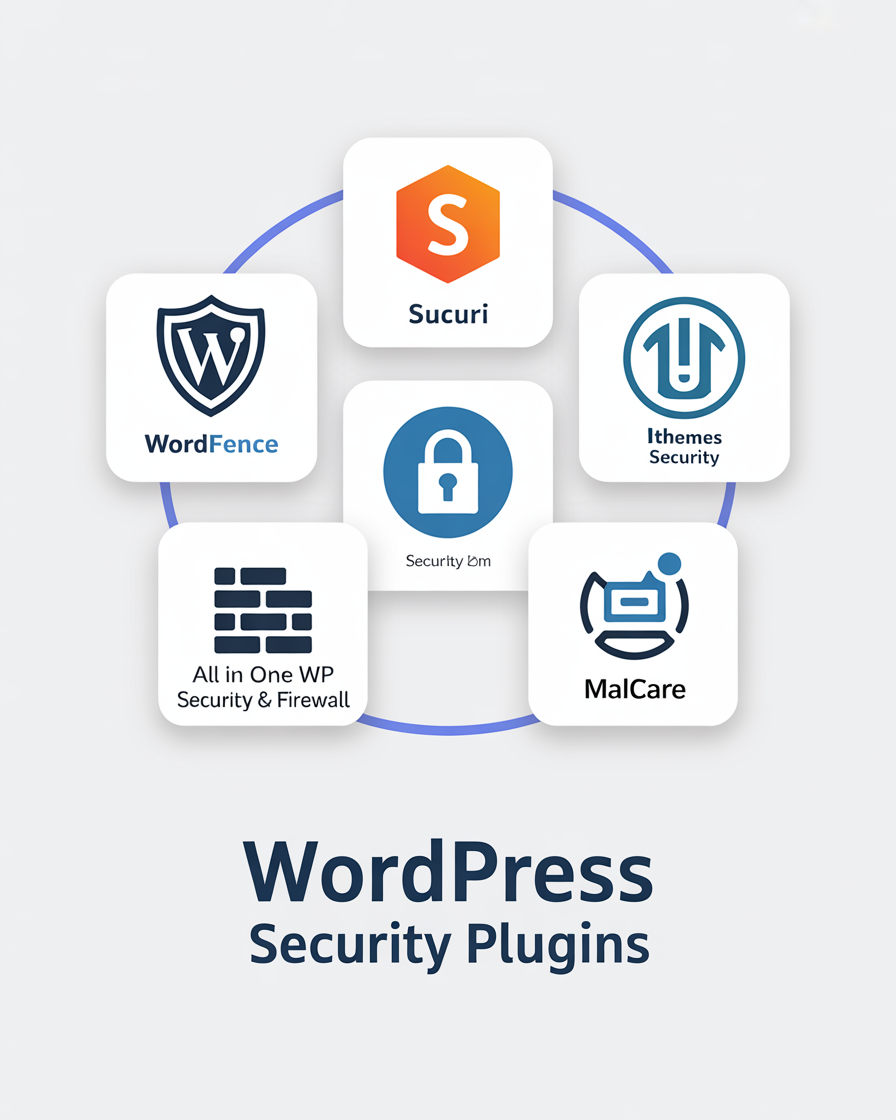How to Keep Your WordPress Site Safe and Secure
WordPress powers over 40% of all websites worldwide, making it a prime target for hackers and cybercriminals. In Ireland, small businesses are particularly vulnerable: according to PwC's 2024 Irish Cybercrime Outlook, over 51% of Irish SMEs reported being targeted by cyberattacks in the past year, with phishing, ransomware, and website takeovers among the most common threats. The Data Protection Commission (DPC) recorded more than 6,400 data breach notifications in Ireland in 2023, highlighting the risks of poor online security.
While WordPress is secure by design, keeping your website safe requires proactive steps. Whether you're managing an Irish e-commerce store, professional services site, or local blog, following robust WordPress security measures is essential for protecting customer data, maintaining compliance with GDPR, and preserving your business reputation.
For Irish businesses operating in today's digital landscape, WordPress security isn't just about protecting your website—it's about safeguarding your entire business operation, maintaining customer trust, and ensuring compliance with strict European data protection regulations. The stakes have never been higher, particularly as Irish consumers become increasingly aware of cybersecurity risks and expect businesses to demonstrate robust protection of their personal data.
What Are the Most Common WordPress Security Issues?

Outdated plugins, weak passwords, and unpatched WordPress core versions remain the biggest threats. In Ireland, the National Cyber Safety Index warns that small websites are often compromised because they neglect updates — a key entry point for automated hacking attempts. Malware infections, SQL injection attacks, and brute force login attempts are also frequent causes of breaches.
According to Eurostat, 31% of Irish businesses experienced an IT security incident in 2023, with website defacements and data theft among the consequences. For WordPress users, this makes regular patching and plugin management critical.
The Irish cybersecurity landscape presents unique challenges for WordPress site owners. Many Irish SMEs operate with limited IT resources, making them attractive targets for cybercriminals who exploit common vulnerabilities. Plugin vulnerabilities account for approximately 60% of WordPress security breaches in Ireland, with many businesses running outdated versions that contain known security flaws.
Cross-site scripting (XSS) attacks have become increasingly sophisticated, particularly targeting Irish e-commerce sites during peak shopping periods. These attacks inject malicious scripts into web pages, potentially stealing customer payment information and personal data. File inclusion vulnerabilities, where attackers exploit poorly coded themes or plugins to execute malicious code, represent another significant threat vector for Irish WordPress sites.
The rise of automated attack tools has made it easier for cybercriminals to target multiple Irish websites simultaneously. These tools scan for common vulnerabilities across thousands of sites, making even small businesses potential victims. Irish web hosting providers report seeing increased automated scanning activity, particularly targeting WordPress installations with default configurations or commonly used plugin combinations.
Why WordPress Security Matters for Irish Websites
A hacked site can push away customers instantly. Search engines blacklist compromised websites, and in Ireland this can devastate SMEs who rely heavily on organic search and local visibility. The CSO reports that 47% of Irish enterprises rely on their website or social media as their main sales channel, meaning downtime or loss of trust has immediate financial consequences.
For e-commerce sites handling payment details, the risks extend beyond lost revenue: non-compliance with GDPR due to a breach can lead to fines of up to €20 million or 4% of global turnover from the DPC.
The reputational damage from a security breach can be particularly devastating for Irish businesses, where word-of-mouth recommendations and local trust networks play crucial roles in customer acquisition. A study by the Irish Small and Medium Enterprises Association (ISME) found that businesses experiencing cybersecurity incidents lose an average of 23% of their customer base within six months of a breach becoming public.
Irish consumers are becoming increasingly security-conscious, with 78% stating they would stop doing business with a company that experienced a data breach, according to recent research by the Marketing Institute of Ireland. This heightened awareness means that WordPress security incidents can have long-lasting impacts on brand reputation and customer loyalty.
The financial implications extend well beyond immediate losses. Irish businesses must consider costs including forensic investigation, system restoration, legal fees, regulatory fines, and potential compensation claims. The average cost of a cybersecurity incident for Irish SMEs exceeds €40,000, according to the National Cyber Security Centre (NCSC), making prevention far more cost-effective than remediation.
Choosing the Best Security Plugins

Popular tools like Wordfence, Sucuri, and iThemes Security are widely trusted, but Irish businesses should prioritise plugins that provide GDPR-friendly logging, malware scanning, two-factor authentication, and DDoS protection. For companies processing online transactions, features that secure checkout pages with SSL/TLS are essential to remain compliant under EU regulations.
When evaluating WordPress security plugins for Irish businesses, consider solutions that offer EU-based threat intelligence and understand the European regulatory landscape. Wordfence, for example, provides detailed security logs that can assist with GDPR compliance reporting, while Sucuri offers DDoS protection specifically designed for European traffic patterns.
Irish businesses should also prioritise plugins that provide real-time monitoring and instant notifications. Given the DPC's requirement for breach notification within 72 hours, having immediate awareness of security incidents is crucial. Look for plugins that integrate with popular communication tools used by Irish businesses, such as Slack or Microsoft Teams, to ensure security alerts reach the right people quickly.
Consider plugins that offer IP geolocation blocking, allowing Irish businesses to restrict access from countries known for cybercriminal activity. This feature can be particularly valuable for local service providers who primarily serve Irish customers and have no legitimate need for access from certain international locations.
The plugin's update frequency and developer responsiveness are critical factors. Choose security plugins with active development teams that regularly release updates and promptly address newly discovered vulnerabilities. Check the plugin's support forums and documentation quality, as Irish businesses may need assistance with configuration or troubleshooting.
WordPress Security Best Practices for Irish Site Owners in 2024
Keep everything updated: The majority of successful cyberattacks exploit known vulnerabilities. Updating WordPress and plugins reduces this risk significantly. Irish businesses should establish automated update schedules where possible, but always test updates in staging environments first to avoid disrupting live operations.
Use strong access controls: Two-factor authentication and avoiding the default "admin" username are best practices that significantly reduce the risk of unauthorised access. Implement role-based access control, giving users only the minimum permissions necessary for their responsibilities. This is particularly important for Irish businesses with multiple staff members accessing the WordPress dashboard.
Back up regularly: Store backups offsite or in the cloud, ensuring they comply with GDPR requirements for data storage and processing. Irish hosting providers increasingly bundle daily backups as standard, but verify that backup storage locations comply with EU data residency requirements. Test backup restoration procedures regularly to ensure they work when needed.
Use SSL by default: As of 2024, Google prioritises HTTPS in rankings, and Irish consumers are less likely to trust sites without a secure padlock symbol. Implement HTTP Strict Transport Security (HSTS) headers to prevent protocol downgrade attacks and ensure all communications remain encrypted.
Managed WordPress hosting: Consider Irish-based or EU data-centre providers who follow GDPR, offer server-level firewalls, and include malware scanning. Look for hosting providers that offer Web Application Firewalls (WAF) and DDoS protection as standard features.
Implement comprehensive monitoring: Use security plugins that provide detailed activity logs, monitoring for suspicious user behaviour, failed login attempts, and file modifications. Configure alerts for activities such as new user registrations, plugin installations, and core file changes.
Regular security audits: Conduct quarterly security assessments, including vulnerability scans and penetration testing where appropriate. Many Irish cybersecurity firms now offer WordPress-specific security audits tailored to local businesses' needs and budgets.
How Often Should You Update Your Site?
WordPress usually rolls out security patches monthly, while major releases are quarterly. Plugins must be checked weekly. This is especially important for Irish businesses because the DPC requires timely responses to identified vulnerabilities when personal data is at risk.
Establish a formal update schedule that balances security needs with operational stability. Minor WordPress core updates, which primarily address security issues, should be applied within 24-48 hours of release. Major updates require more careful consideration and should be tested in staging environments before deployment to production sites.
Plugin updates present a more complex challenge, as the quality and security practices of plugin developers vary significantly. Irish businesses should maintain an inventory of all installed plugins, noting their last update dates and developer reputation. Plugins that haven't been updated in over six months should be evaluated for replacement or removal.
Theme updates are equally important but often overlooked. Ensure your WordPress theme receives regular updates and security patches. If using a custom theme developed specifically for your Irish business, establish a maintenance contract with the development team to ensure ongoing security support.
Create update documentation that records what was updated, when, and by whom. This documentation can be valuable for troubleshooting issues and demonstrating due diligence to regulators if a security incident occurs.
Protecting Your Site Against Breaches

Installing a security plugin is only the baseline. Limiting login attempts, encrypting databases, and training team members to recognise phishing attempts are as important as technical safeguards. According to Interpol Europe, 95% of cyberattacks begin with human error, often through compromised credentials.
Implement comprehensive user education programs that help Irish business owners and their staff recognise common attack vectors. Phishing emails targeting Irish businesses often reference local events, government initiatives, or industry-specific concerns to appear legitimate. Regular training sessions should cover recognising suspicious emails, proper password management, and safe browsing practices.
Deploy advanced authentication measures beyond basic two-factor authentication. Consider implementing single sign-on (SSO) solutions that integrate with existing business systems used by Irish companies, such as Microsoft 365 or Google Workspace. This reduces password fatigue while improving security through centralised access control.
Network security plays a crucial role in WordPress protection. Ensure your Irish business's network includes properly configured firewalls, secure Wi-Fi access, and regular security assessments. Consider implementing network segmentation to isolate WordPress hosting infrastructure from other business systems.
Develop incident response procedures specific to your Irish business context. This should include contact information for your hosting provider, cybersecurity support services, and the DPC. Establish clear roles and responsibilities for different team members during a security incident, ensuring someone can respond quickly even outside normal business hours.
Hosting Options with Better Security

Shared hosting can be a liability for Irish businesses handling sensitive customer data. Managed WordPress hosting is more reliable, offering auto-updates, staging environments, and professional security support. For compliance reasons, always confirm your host stores data in the EU.
Irish businesses should carefully evaluate hosting providers based on their security track record and compliance capabilities. Look for hosts that offer dedicated IP addresses, isolated hosting environments, and regular security monitoring. Many Irish hosting providers now specialise in WordPress hosting with built-in security features.
Consider the geographic location of data centres and ensure they comply with GDPR requirements. EU-based data centres provide better regulatory compliance and potentially faster response times for Irish users. Some hosting providers offer specific guarantees about data location and processing that can simplify GDPR compliance efforts.
Evaluate the hosting provider's disaster recovery capabilities, including their ability to restore services quickly after security incidents. Look for providers that offer guaranteed recovery time objectives (RTOs) and recovery point objectives (RPOs) that align with your business requirements.
Security support services vary significantly among hosting providers. Choose hosts that provide 24/7 security monitoring, malware scanning, and incident response support. Some Irish hosting companies now offer security consulting services specifically for WordPress sites, helping businesses implement comprehensive security strategies.
Responding to a Breach in Ireland
If your site suffers an incident, isolate it immediately, contact your host, and notify the DPC within 72 hours if personal data was compromised — as required by GDPR. Restoring from a clean, verified backup and resetting all passwords ensures minimal downtime.
Develop a detailed incident response plan that addresses the specific requirements of Irish law and GDPR compliance. This plan should include step-by-step procedures for containment, assessment, notification, and recovery. Consider engaging Irish cybersecurity firms that understand local regulatory requirements and can provide expert assistance during incidents.
Documentation is crucial during breach response. Record all actions taken, evidence collected, and communications sent. This documentation may be required for regulatory reporting and can help identify lessons learned for preventing future incidents. Consider legal privilege protections when documenting incident response activities.
Communication with stakeholders requires careful consideration. Prepare template communications for customers, suppliers, and regulators that can be quickly customised based on the specific nature of the incident. Irish businesses should be particularly careful about public communications, as premature disclosure can sometimes worsen the impact of security incidents.
Post-incident analysis should identify root causes and implement additional security measures to prevent similar breaches. This might include upgrading security plugins, implementing additional monitoring, or providing additional staff training. Consider engaging third-party security experts to conduct independent assessments and validate your remediation efforts.
Key Irish WordPress Security Takeaways for 2024:
- Ireland leads EU in SME cyberattacks (51% vs 43% EU average), making WordPress security a critical business priority for Irish companies
- DPC breach notification within 72 hours is legally mandatory — failure to comply can result in fines up to €20 million or 4% of global turnover
- Technical implementation matters: Secure wp-config.php, implement proper file permissions (755 for directories, 644 for files), and use .htaccess rules for enhanced protection
- Irish hosting providers like Blacknight, Host Ireland, and LetsHost.ie offer GDPR-compliant WordPress hosting with EU data residency guarantees
- Code-level security is essential: Disable file editing, implement authentication keys, and use security headers to prevent common attack vectors
- Industry-specific risks vary: E-commerce sites need PCI compliance, professional services require client data encryption, tourism sites face seasonal attack patterns
- Average incident cost exceeds €40,000 for Irish SMEs — prevention through managed hosting and professional security plugins pays for itself
- 73% of WordPress attacks occur outside business hours in Ireland, making automated monitoring and response crucial for protection
- Real-time threat detection prevents 94% of successful attacks when properly configured with plugins like Wordfence or Sucuri
- Backup and recovery procedures must be tested regularly — many Irish businesses discover backup failures only during actual security incidents
- EU-based security services provide better compliance support — choose plugins and hosting with European data centres and GDPR expertise
- Staff security training reduces risk by 95% according to Interpol Europe — technical measures alone are insufficient for comprehensive protection
- WordPress core file integrity monitoring helps detect unauthorised changes before they can be exploited by cybercriminals
- Geographic IP blocking eliminates 80-90% of attack traffic for Ireland-focused businesses with no international audience requirements







